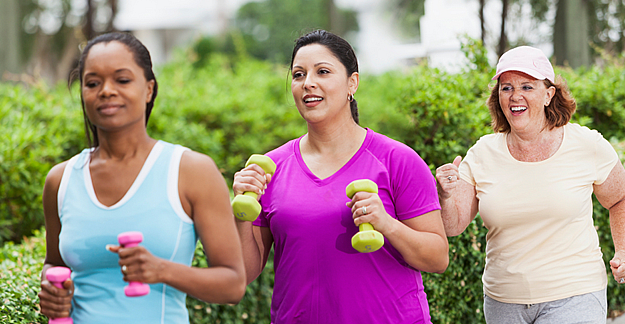Awareness of polycystic ovarian syndrome (PCOS) is rising, and women are finally getting the attention and treatment they deserve. As studies shed new light on the condition, the benefits of a healthy lifestyle are more apparent than ever.
An exercise routine is crucial for everyone, regardless of gender, age, or health risk. For those with PCOS, it’s even more dire. The beauty is, you can start exercising for PCOS anywhere, including right at home.
Working Out for PCOS
Weight management may be one of the most challenging aspects of your condition. However, PCOS is also responsible for several other risk factors, including insulin resistance, cardiovascular disease, high blood pressure, infertility, and endometrial cancer.
Physical activity boosts endocrine health and hormonal balance, so regular exercise significantly improves some of the trickier PCOS symptoms and your mental health. Weight loss in general has many health benefits, reducing the risks for everything from heart disease to mobility pain.
It can also regulate painful menstrual cycles — women with PCOS may endure irregular cycles lasting over 35 days or less than 21. Many times, severe cramping accompanies their periods. A 2019 study found that irregular and heavy periods were associated with more severe menstrual pain in Korean women. Therefore, exercise could be the ticket needed to easier PCOS pain management and overall healthier living.
4 Exercises for PCOS
Before starting any new routine, remember that over-exercising can worsen irregular periods or cause missed ones — the same goes for suddenly beginning a vigorous exercise regimen after leading a sedentary lifestyle. However, any physical activity benefits women with PCOS. Here are four exercises for PCOS you can do at home.
-
Aerobic Exercise
Get your heart pumping with aerobic exercises like jogging, Zumba, elliptical bicycling, or kickboxing — workouts that are easy to set up in your home or garage. You can even purchase fitness videos or take online classes from the comfort of your living room.
Researchers have suggested that 120 minutes of weekly high-intensity aerobics enabled peak cardiorespiratory fitness in women with PCOS. The study participants also showed a 13% reduction in all-risk mortality.
-
Yoga
You may have pelvic floor dysfunction due to the physical and emotional stress, follicular pain, hormonal changes, obesity, and inflammation experienced with PCOS. Globally, up to 70% of women experience urinary incontinence due to pelvic floor issues, while some have prolapse. Additionally, 27% of women who take birth control to manage PCOS symptoms struggle with incontinence.
Yoga is excellent for PCOS and pelvic floor strengthening. A recent study found that 12 weeks of Mula Bandha yoga — a practice that integrates Kegel exercises or the contraction of the perineum muscles — significantly improved pelvic floor muscle strength.
Practicing yoga also relieves stress and depression, which many women with PCOS experience due to symptoms.
-
Walking
If the weather is nice, take a walk around the block. You don’t need to invest in a treadmill or have a coach help you create a walking routine at home — unless you want to, of course.
Water retention and inflammatory soreness are prevalent during menstrual cycles in women with PCOS. However, studies show walking for 30 minutes a day reduces chronic inflammation.
Likewise, according to Harvard Medical School, a 15-minute walk is all you need to curb your sweet tooth — something you might struggle to tame if you have PCOS. That may also provide a double bonus, as sugar often ups weight and makes PCOS symptoms more severe.
Research also indicated an 18% reduction in depressive symptoms for people who walk just four hours weekly. Women with PCOS are 38.6% and 25.7% more likely to have anxiety and depression, respectively — nearly two to eight times higher than other groups. Read more about the benefits of walking for health here.
-
Strength Training
Strength training usually comprises weights, resistance bands, or other equipment to build healthy muscles and bones. It also helps women with PCOS burn extra calories to prevent weight gain.
You can purchase various strength training equipment to create an at-home gym. Just be careful not to injure yourself if you’re weight training alone. You may want another person nearby to spot you.
If you are just getting started, try lifting canned goods in your home. These approximately one-pound preserved foods can be a great starting point without even heading to the store for equipment.
Exercise for Optimal Health With PCOS
Having PCOS can be frustrating but manageable with healthy lifestyle changes. Exercise won’t provide a complete cure, but it will dramatically improve your symptoms and lower your risk for related health complications.






